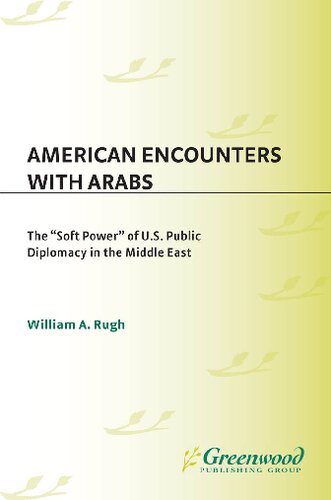Product desciption
American Encounters With Arabs The Soft Power Of Us Public Diplomacy In The Middle East William A Rugh by William A. Rugh 9780275988173, 0275988171 instant download after payment.
For sixty years, U.S. government officials have conducted public diplomacy programs to try to reach Arab public opinion--to inform, educate, and understand Arab attitudes. American public affairs officers have met serious challenges in the past, but Arab public criticism of the United States has reached unprecedented levels since September 11, 2001. Polls show that much of the negative opinion of the United States, especially in the Middle East, can be traced to dissatisfaction with U.S. foreign policy. Rugh, a retired career Foreign Service officer who twice served as ambassador to countries in the region, explains how U.S. government officials have dealt with key problem issues over the years, and he recommends ways that public diplomacy can better support and enhance U.S. national interests in the Middle East. This struggle for the hearts and minds of the Arab world, so crucial to the success of American efforts in post-occupation Iraq, is carried out through broadcasting, cultural contacts, and educational and professional exchanges.
Rugh describes the difference between public diplomacy and propaganda. He points out that public diplomacy uses open means of communication and is truthful. Its four main components are explaining U.S. foreign policy to foreign publics; presenting them with a fair and balanced picture of American society, culture, and institutions; promoting mutual understanding; and advising U.S. policy makers on foreign attitudes. Public diplomacy supports the traditional diplomatic functions of official business between governments. Whereas diplomats from the United States deal with diplomats of foreign governments, public affairs officers deal with opinion leaders such as media editors, reporters, academics, student leaders, and prominent intellectuals and cultural personalities. Rugh provides an up-close-and-personal look at how public affairs officers do their jobs, how they used innovation in their efforts to meet the challenges of the past, and how they continue to do so in the post-September 11 era.


